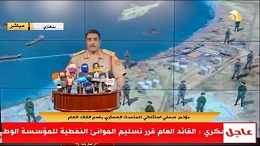By Sami Zaptia.

London, 26 June 2018:
At a press conference held yesterday in Benghazi, the official spokesperson for the Khalifa Hafter-led Libyan National Army (LNA), Ahmed Mesmari, said that the recent battle at Libya’s eastern oil crescent region was not a ‘‘local’’ battle, but that it was an ‘‘international’’ battle.
In announcing the decision by the LNA to hand over the recaptured oil crescent storage tanks and port terminals to the eastern-based National Oil Corporation (NOC), as opposed to the internationally-recognized NOC in Tripoli, Mesmari said the LNA had suffered and received no reward for its efforts.
Mesmari said that after freeing the oil installation from the then Petroleum Facilities Guard (PFG) regional commander Ibrahim Jadran in September 2016 and handing them over to the then unified NOC based in Tripoli, the LNA were surprised that the LNA received no support or reward for its efforts.
Ibrahim Jadran had been extorting the Libyan state out of hundreds of millions in order to allow the state to resume oil exports, Mesmari explained.
Instead, he said that the LNA has been the subject of five different attack in the oil crescent region since September 2016 – which it has successfully repelled.
Mesmari said that the LNA has lost 183 soldiers and suffered around 300 wounded soldiers in defence of the oil crescent. The LNA had also lost large amounts of weapons and munitions. For this, he added, the LNA had not received ‘‘a single dirham’’ (penny) from the Tripoli NOC.
He also criticized the Tripoli NOC chairman Sanalla for not crediting the LNA for their efforts in recapturing and protecting Libya’s oil installations.
However, after this latest attack on the oil crescent, Mesmari said that many answers to many questions were now revealed. These included: from where were these (Ibrahim Jadran) militias getting their financial support? Where were they getting their (post battle) medical care? Where were they getting their weapons from? And we discovered that they were paying Chadian mercenaries in dollars, Mesmari added.
Mesmari said that in fact they have discovered that these, what he called ‘‘criminal and terrorist gangs of Al-Qaeda and Chadian opposition soldiers’’, were being financed from the revenues of Libya’s oil – the same Libyan oil that the LNA is protecting.
‘‘We protect, sacrifice, get killed and kill so that oil tankers leave (Libyan ports) and return as money which reaches militias which attack us again’’, he explained.
As a result, explained Mesmari, the decisive decision was taken – a decision that was taken reluctantly and which has long been called for by many – to hand over the oil crescent to the eastern based NOC under the leadership of Faraj Saeed Al-Hassi. All the oil installations in the eastern region will be under the protection of the LNA and run by the eastern-based LNA, he added.
Mesmari assured Libya’s foreign oil partners that the LNA and the eastern NOC will protect their partnerships.
He also informed the Libyan public that ‘‘many of the country’s financial problems will be resolved now and urgently’’.
He claimed that there was much corruption in the Libyan oil sector with militias receiving high salaries – up to LD 5,000 / month – while those wounded protecting Libya’s oil do not receive medical care financed by Tripoli coffers.
Mesmari said that the LNA were still pursuing the Ibrahim Jadran forces – and will continue to pursue them and those who supported them. We will stop looking the other way, he said
The LNA should be financed and should have a special status as a protector of the nation’s wealth, security, sovereignty and power. It should be considered as Libya’s fourth region (after Tripolitania, Cyrenaica and Fezzan), he concluded.









